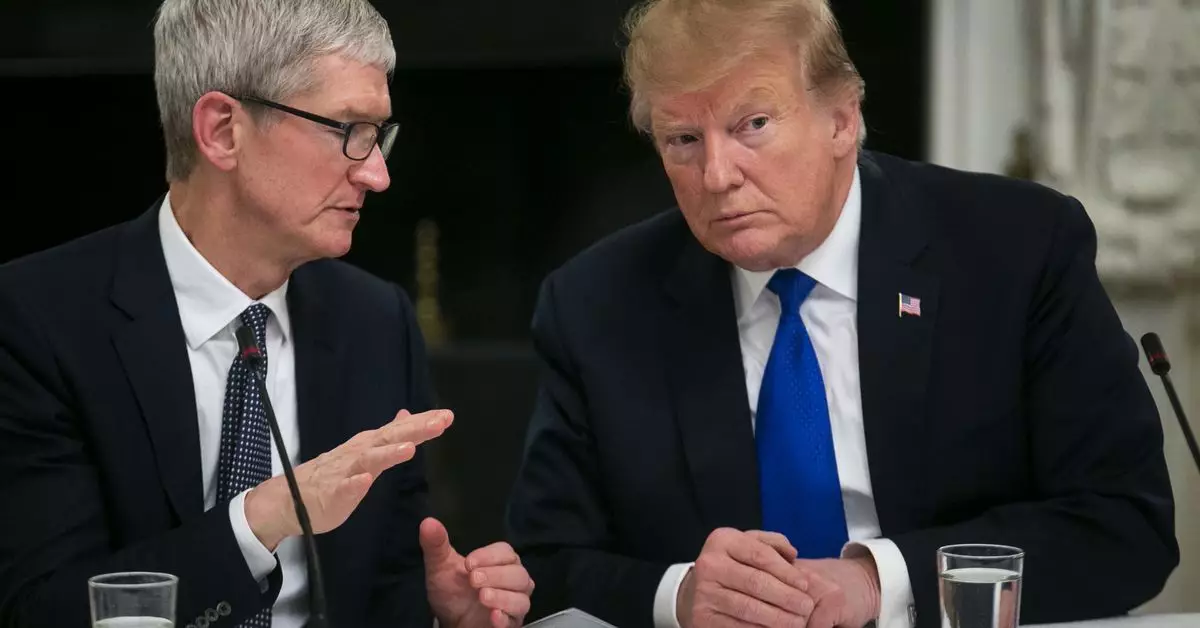In an era where technology and politics increasingly intertwine, the upcoming dinner between Apple CEO Tim Cook and President-elect Donald Trump at Mar-a-Lago serves as a significant illustration of the delicate balancing act corporate leaders must perform. Cook’s visit marks the first meeting with Trump since the latter’s electoral victory, underscoring the evolving dynamics in tech leadership amid shifting political landscapes. Cook’s previous interactions with Trump during his first term set a precedent that many other tech executives look to emulate, demonstrating that relationship-building at the highest levels can often translate into favorable conditions for businesses.
The agenda for this dinner is likely not just a cordial exchange but a strategic discussion that touches on pressing issues that could profoundly impact Apple’s future. A primary concern on Cook’s radar is the potential imposition of tariffs, a factor that could alter Apple’s cost structure and competitive edge in the global market. Tariff discussions have become a cornerstone of U.S. trade policy, particularly in connection with China, where Apple relies heavily on sourcing components and manufacturing. Thus, Cook’s engagement with Trump might aim to secure a more favorable trade environment, essential for maintaining Apple’s position as a leading tech giant.
Moreover, the scrutiny Apple faces from the European Union regarding antitrust regulations further complicates the company’s landscape. With claims of anticompetitive behavior surrounding App Store policies, Cook’s previous conversations with Trump regarding these fines highlight a proactive approach in navigating regulatory challenges. It’s indicative of a larger trend where tech leaders are sought not only as business innovators but also as crucial stakeholders in shaping public policy. The former president’s vocal support could provide Apple with a shield against punitive measures from foreign entities.
Cook’s dinner with Trump coincides with a flurry of meetings involving other tech titans, including Google’s Sundar Pichai, Amazon’s Jeff Bezos, and Meta’s Mark Zuckerberg, reflecting a concerted effort by technology leaders to maintain influence in Washington. This pattern signifies a broader strategy where tech companies are willing to invest heavily—both in campaigns and direct engagement—to secure a foothold in political conversations that directly impact their operations.
As tech giants like Meta and OpenAI contribute substantial donations to political campaigns, it becomes increasingly evident that the relationship between Silicon Valley and Washington is complex and transactional. While such interactions raise ethical considerations regarding corporate influence in governance, they are a reality of modern business strategy. Cook’s dinner serves as a reminder of the ongoing necessity for technological leaders to engage politically as they navigate challenges that threaten their business models.
Tim Cook’s engagement with Donald Trump represents more than just a meeting between two prominent figures; it embodies a critical intersection of technology and politics. With vital issues on the table—tariffs and regulatory scrutiny—this dinner may prove pivotal in shaping the future trajectory of Apple and possibly the broader technology industry. As Cook continues to navigate these complex waters, his ability to cultivate relationships and influence policy could determine not only Apple’s success but also set a benchmark for how tech companies interact with political leadership in an ever-evolving landscape.

